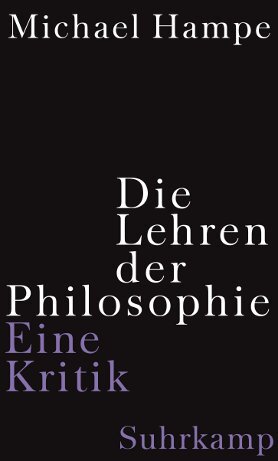Michael Hampe
Die Lehren der Philosophie. Eine Kritik
[The teachings of philosophy. A review]
- Suhrkamp Verlag
- Berlin 2014
- ISBN 978-3-518-58605-1
- 455 Pages
- Publisher’s contact details
Michael Hampe
Die Lehren der Philosophie. Eine Kritik
[The teachings of philosophy. A review]
Sample translations
Review
“The Revolution is like Saturn; it devours its own chil-dren.” This quip my Girondist leader Vergniaud, uttered at a time when the guillotines were running full tilt in Paris, could also be used to describe the relationship of the modern natural sciences to the arts and humanities. It was the methods and theoretical discourses of modern philosophers that provided the intellectual framework for breathtaking scientific and technological progress. And yet in terms of social status and, of course, the allocation of direly needed funds, the increasing “success” of the natural sciences and the ever greater “failure” of the arts and humanities seem to be inversely proportional developments. The greater the technical progress, the more the natural sciences look down upon the human sciences, the kindergarten of science.
What makes this long-since overwhelming age of technology so self-confident in the view of many observers (philosopher Michael Hampe included) is the universal claim it makes through its ability to explain and deduce almost everything. The many chinks in the armor of science inflicted by critics throughout the ages, from Kant and Wittgenstein to Gödel and Feyerabend, do nothing to alter this fact. Today’s scientific system can rightly be called totalitarian – a system Michael Hampe calls “scientism.” The remaining disciplines, the arts and humanities, are dismissed as antiquated or quasi-therapeutic and emotive institutions, tolerated, at best, as “culture” modules for after hours.
Zurich philosopher Michael Hampe entered the scene with his lengthy 450-page essay Die Lehren der Philosophie (The Teachings of Philosophy) – an essay of magnum opus force – in an attempt to critique and sometimes rescue these teachings: rescue them from the general, civil-religious technological fuss of the masses and the media, as well as from the more erudite among the practitioners of scientism, such as Donald Davidson and Thomas Metzinger.
Hampe begins his tour d’horizon through 2,500 years of intellectual history by reminding his readers that Socrates, the archetype of the philosophical teacher, did not develop a doctrine but, rather, criticized and refuted doctrines. His main concern was using his method of “midwifery” to produce a kind of productive confusion in his partners in dialogue, which in turn gave rise to an inkling of the good life. Hampe sees this as the power of narration at work, which – together with analytical disillusionment – he describes as the most effective long-term disciplines of thought, and the ones most worthy of preserving.
Well-versed in the arguments of classical, analytical and postmodern philosophy, as well as with rigorous scientific theory, he systematically pursues his line of thought through the oft interwoven eras of Western and Eastern intellectual history. Always insightful and elegant, he works his way through the relevant material, distinguishing between the claims of doctrine and openly narrative, disillusioning philosophy. Michael Hampe’s arguments and critiques are as brilliant as they are entertaining, and devoid of any philosophical arrogance. The end of his many deliberations, conducted with intense and convincing pathos, is mysticism and philosophical silence, because for Hampe these are the final and quite auspicious consequences of philosophical engagement.
Hampe does not portray Wittgenstein as a mystic, but goes back to Meister Eckhart, describing almost Zen Buddhist states of (transcendental) fullness and emptiness. The teachings of philosophy, a discipline Hampe thinks will continue to exist, are both narrative and disillusioning. Teachings which facilitate and provide a backdrop for reflection and which do not impart doctrines through a dubious art of reasoning. The pragmatist Hampe shows how utterly scandalous it is that philosophy is not an educational priority in schools, and that the mandatory study of philosophy at universities, the examen philosophicum, is no longer standard for all academics. This wonderfully convincing and thought-provoking book is a polemic and non-doctrinaire philosophy at once.

What makes this long-since overwhelming age of technology so self-confident in the view of many observers (philosopher Michael Hampe included) is the universal claim it makes through its ability to explain and deduce almost everything. The many chinks in the armor of science inflicted by critics throughout the ages, from Kant and Wittgenstein to Gödel and Feyerabend, do nothing to alter this fact. Today’s scientific system can rightly be called totalitarian – a system Michael Hampe calls “scientism.” The remaining disciplines, the arts and humanities, are dismissed as antiquated or quasi-therapeutic and emotive institutions, tolerated, at best, as “culture” modules for after hours.
Zurich philosopher Michael Hampe entered the scene with his lengthy 450-page essay Die Lehren der Philosophie (The Teachings of Philosophy) – an essay of magnum opus force – in an attempt to critique and sometimes rescue these teachings: rescue them from the general, civil-religious technological fuss of the masses and the media, as well as from the more erudite among the practitioners of scientism, such as Donald Davidson and Thomas Metzinger.
Hampe begins his tour d’horizon through 2,500 years of intellectual history by reminding his readers that Socrates, the archetype of the philosophical teacher, did not develop a doctrine but, rather, criticized and refuted doctrines. His main concern was using his method of “midwifery” to produce a kind of productive confusion in his partners in dialogue, which in turn gave rise to an inkling of the good life. Hampe sees this as the power of narration at work, which – together with analytical disillusionment – he describes as the most effective long-term disciplines of thought, and the ones most worthy of preserving.
Well-versed in the arguments of classical, analytical and postmodern philosophy, as well as with rigorous scientific theory, he systematically pursues his line of thought through the oft interwoven eras of Western and Eastern intellectual history. Always insightful and elegant, he works his way through the relevant material, distinguishing between the claims of doctrine and openly narrative, disillusioning philosophy. Michael Hampe’s arguments and critiques are as brilliant as they are entertaining, and devoid of any philosophical arrogance. The end of his many deliberations, conducted with intense and convincing pathos, is mysticism and philosophical silence, because for Hampe these are the final and quite auspicious consequences of philosophical engagement.
Hampe does not portray Wittgenstein as a mystic, but goes back to Meister Eckhart, describing almost Zen Buddhist states of (transcendental) fullness and emptiness. The teachings of philosophy, a discipline Hampe thinks will continue to exist, are both narrative and disillusioning. Teachings which facilitate and provide a backdrop for reflection and which do not impart doctrines through a dubious art of reasoning. The pragmatist Hampe shows how utterly scandalous it is that philosophy is not an educational priority in schools, and that the mandatory study of philosophy at universities, the examen philosophicum, is no longer standard for all academics. This wonderfully convincing and thought-provoking book is a polemic and non-doctrinaire philosophy at once.
Translated by David Burnett

By Marius Meller
Marius Meller studied German philology, philosophy, and musicology, and has worked as a literary editor at the Frankfurter Rundschau and Berliner Tagesspiegel newspapers. He lives in Berlin as a writer and works as a freelance literature critic for Deutschlandradio and Deutschlandfunk.
